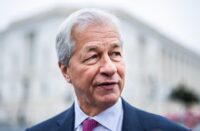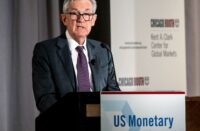Federal Reserve Governors Michelle Bowman and Christopher Waller were recently photographed during a conference break at Stanford University’s Hoover Institution on May 6, 2022. This image was taken amidst the news of the Federal Reserve’s top financial regulator’s untimely exit, paving the way for a successor who is more favorable to the industry. This move is seen as yet another advantage for the United States banking sector, which is currently buoyed by the positive vibes following the election.
Michael Barr, Federal Reserve Vice Chair for Supervision, announced on Monday his intention to vacate his position by next month. This decision was made to dodge a potential drawn-out legal dispute with the Trump administration, which had contemplated his removal. Barr’s declaration represents a shift from his earlier stance and brings his supervisory role to a halt roughly a year and a half ahead of the original schedule. More importantly, it removes a potential obstacle to Donald Trump’s plan to deregulate.
Following Trump’s election in November, banks and other financial entities emerged as significant beneficiaries due to the anticipation of relaxed regulations and an uptick in transaction activities, such as mergers. The newly elected President, a few weeks after his win, nominated Scott Bessent, a hedge fund manager, for the position of Treasury Secretary. However, Trump has yet to announce his choices for the three key bank regulatory bodies: the Federal Deposit Insurance Corp., Office of the Comptroller of the Currency, and the Consumer Financial Protection Bureau.
With Barr’s resignation, a clearer picture of the forthcoming bank regulation is starting to emerge. Trump’s choice for vice chair of supervision is limited to either of the two Republican Fed governors: Michelle Bowman or Christopher Waller.
Bowman, who has been a critic of Barr’s attempt to compel American banks to maintain more capital, is seen as the front-runner. A former community banker and Kansas bank commissioner, she could introduce “industry-friendly reforms” around several contentious areas for banks, as suggested by Alexandra Steinberg Barrage, a former FDIC executive and partner at Troutman Pepper Locke.
Barr’s departure could potentially soften the Basel Endgame, a proposal to boost capital requirements for the world’s largest banks by approximately 19%. If the banks manage to resist this proposal, they could potentially increase their share buybacks among other uses for the capital.
The KBW Bank Index saw a rise of up to 2.4% after Barr’s announcement. Citigroup and Morgan Stanley, both of which have made headlines over regulatory issues last year, saw gains of more than 2%.
Despite stepping down from the vice chair role, Barr will remain one of the seven Fed governors, preserving the current 4-3 advantage of Democrat appointees on the Fed board. This strategic move simultaneously maintains the balance of power for board votes and limits replacement options to those currently serving on the board.




